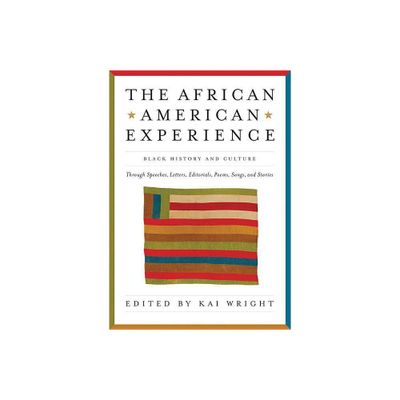Home
Death of the Negro: An African American Experience in the Development of Black Popular Culture
Loading Inventory...
Barnes and Noble
Death of the Negro: An African American Experience in the Development of Black Popular Culture
Current price: $15.00


Barnes and Noble
Death of the Negro: An African American Experience in the Development of Black Popular Culture
Current price: $15.00
Loading Inventory...
Size: OS
*Product Information may vary - to confirm product availability, pricing, and additional information please contact Barnes and Noble
With the Great Liberation War ending in 1865 C.E., 'slave narratives' immediately became the source of information for scholars who studied Black Life and Culture. After William Allen, et al, published the "Slave Songs of the United States," scholars searched for narratives to uncover how the slave lived. The purposes were usually noble in that they were truly interested in black popular culture. The result of this interest was, many allowed the slave to tell the story of suffering and deprivation, i.e., the narrative, without the interference of another voice. For many scholars the intent was to speak to some moral issues affecting the treatment of the slave.
The great interest in the dastardly treatment of the slave kept other aspects of slave life in the background, out of view. Thus, it was seldom to have narratives serve the purpose of looking at the development of culture. As it were, the 'high arts' within the United States as they originated from the slave went unnoticed. The greatest contribution to the art of high culture-from the slave-was music, black music. Modern black music rose from the oppression of African people in the Americas, more specifically from the slaves whose majority population lived within the southern region of the United States. Yet, this knowledge received infrequent reporting in the scholarly and popular documents after the initial reporting during the Reconstruction era.
The overwhelming majority of research devoted to an examination of the relationship of black music to cultural development has been directed at songs that are directly related to the religious practices of the African American. These songs have been generically referred to as spirituals. Spirituals are praise songs that originated in Africa, brought to the United States, revised and became a popular music among the black population. During the period of slavery within the United States, spirituals (called gospel today) were hymns sung by the black at times of worship. A spiritual it is alleged, is the beginning of black music in the United States. All other black musical forms styles and genres emanate from these spirituals.
Mark Fisher may be credited with the development of spiritual beginning thesis. If he is not the originator, he has contributed the most definitive information representing this view. This thesis is called Blues Orthodoxy. Blues Orthodoxy has allowed misconceptions to evolve about the evolution of black music and the complimentary culture within the confines of the American dream. Having difficulty with this thesis, the author has spent the last nine years researching black music of the nineteenth century. The slave narratives housed within the Schomburg Center for the Research in Black Culture have been the basis of these findings.
The volumes that have retained the author's attention are the American Slave Narratives compiled by George Rawick in 1972 and a volume of supplements released in 1977. In total, there are 44 volumes of narratives available for exploration and discovery. Interest was directed toward the music referred to as 'blues.' The ideas that blues did not exist during slavery struck an odd chord since every reason was there for such a musical form to exist. The information was all there. The songs, bluesy in nature were sung as viable expressive styles using poetry and music as the means of expression. These songs were often sung solo and with a string instrument as the accompanying voice. These were neither praise nor work songs. The chords were in the minor tones.
This discourse explores the nature of this music and the impact it has had on the development of the music we call blues today.
PS: A few years later I came across these narratives under the title, "Born in Slavery: Slave Narratives of the Federal Writers Project 1936/37."
The great interest in the dastardly treatment of the slave kept other aspects of slave life in the background, out of view. Thus, it was seldom to have narratives serve the purpose of looking at the development of culture. As it were, the 'high arts' within the United States as they originated from the slave went unnoticed. The greatest contribution to the art of high culture-from the slave-was music, black music. Modern black music rose from the oppression of African people in the Americas, more specifically from the slaves whose majority population lived within the southern region of the United States. Yet, this knowledge received infrequent reporting in the scholarly and popular documents after the initial reporting during the Reconstruction era.
The overwhelming majority of research devoted to an examination of the relationship of black music to cultural development has been directed at songs that are directly related to the religious practices of the African American. These songs have been generically referred to as spirituals. Spirituals are praise songs that originated in Africa, brought to the United States, revised and became a popular music among the black population. During the period of slavery within the United States, spirituals (called gospel today) were hymns sung by the black at times of worship. A spiritual it is alleged, is the beginning of black music in the United States. All other black musical forms styles and genres emanate from these spirituals.
Mark Fisher may be credited with the development of spiritual beginning thesis. If he is not the originator, he has contributed the most definitive information representing this view. This thesis is called Blues Orthodoxy. Blues Orthodoxy has allowed misconceptions to evolve about the evolution of black music and the complimentary culture within the confines of the American dream. Having difficulty with this thesis, the author has spent the last nine years researching black music of the nineteenth century. The slave narratives housed within the Schomburg Center for the Research in Black Culture have been the basis of these findings.
The volumes that have retained the author's attention are the American Slave Narratives compiled by George Rawick in 1972 and a volume of supplements released in 1977. In total, there are 44 volumes of narratives available for exploration and discovery. Interest was directed toward the music referred to as 'blues.' The ideas that blues did not exist during slavery struck an odd chord since every reason was there for such a musical form to exist. The information was all there. The songs, bluesy in nature were sung as viable expressive styles using poetry and music as the means of expression. These songs were often sung solo and with a string instrument as the accompanying voice. These were neither praise nor work songs. The chords were in the minor tones.
This discourse explores the nature of this music and the impact it has had on the development of the music we call blues today.
PS: A few years later I came across these narratives under the title, "Born in Slavery: Slave Narratives of the Federal Writers Project 1936/37."

















